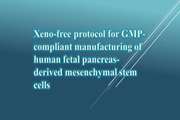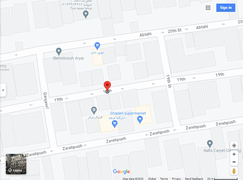Improved Differentiation of hESC-Derived Pancreatic Progenitors by Using Human Fetal Pancreatic Mesenchymal Cells in a Micro-sca
Improved Differentiation of hESC-Derived Pancreatic Progenitors by Using Human Fetal Pancreatic Mesenchymal Cells in a Micro-scalable Three-Dimensional Co-culture System
Therefore, in our study, the impact of three-dimensional (3D) co-culture of human fetal pancreatic-derived mesenchymal cells (hFP-MCs) with human embryonic stem cell-derived pancreatic progenitors (hESC-PPs) development towards endocrine and beta cells was assessed. However, they showed higher expression of DESMIN compared to BM-MSCs. After co-culture of hESC-PPs with hFP-MCs, the pancreatic progenitor (PP) spheroids generated in Matrigel had higher expression of NGN3 and INSULIN than BM-MSCs co-culture group, which shows an inductive impact of pancreatic mesenchyme on hESC-PPs beta-cells maturation.
Xeno-free protocol for GMP-compliant manufacturing of human fetal pancreas-derived mesenchymal stem cells
Xeno-free protocol for GMP-compliant manufacturing of human fetal pancreas-derived mesenchymal stem cells
To manufacture clinical-grade MSCs, animal-free culture protocols are preferred. A side-by-side comparison was made to evaluate the effect of each serum on proliferation rate, cell cycle, senescence, multi-lineage differentiation capacity, immunophenotype, and tumorigenesis of FPMSCs. Results: Flow cytometry analysis and three-lineage differentiation ability demonstrated that fibroblast-like cells obtained from primary culture had MSCs' characteristics. In conclusion, HS can effectively replace FBS for clinical-grade FPMSCs manufacturing.
Human placenta-derived mesenchymal stem cells transplantation in patients with acute respiratory distress syndrome (ARDS) caused
Human placenta-derived mesenchymal stem cells transplantation in patients with acute respiratory distress syndrome (ARDS) caused by COVID-19 (phase I clinical trial): safety profile assessment
Acute respiratory distress syndrome (ARDS) is one of the most important causes of death in COVID-19 patients. Mesenchymal stem cells have been the subject of many clinical trials for the treatment of ARDS because of their immunomodulatory, anti-inflammatory, and regenerative potentials. The aim of this phase I clinical trial was the safety assessment of allogeneic placenta-derived mesenchymal stem cells (PL-MSCs) intravenous injection in patients with ARDS induced by COVID-19. Methods: We enrolled 20 patients suffering from ARDS caused by COVID-19 who had been admitted to the intensive care unit.
Encapsulation of rat bone marrow‑derived mesenchymal stem cells in collagen type I containing platelet‑rich plasma for
Encapsulation of rat bone marrow‑derived mesenchymal stem cells (rBMMSCs) in collagen type I containing platelet‑rich plasma for osteoarthritis treatment in rat model
efficacy of an injectable tissue-engineered construct composed of rat bone marrow mesenchymal stem cells (rBMMSCs), platelet-rich plasma (PRP), and collagen type I in rat model of OA. construct was formed by a combination of appropriate amount of collagen type I, PRP and rBMMSCs. In vitro studies were tissue-engineered construct was injected in knee joints of rat models of OA (24 rats in 4 groups: OA, OA MSC, OA collagen of knee joint samples were performed to evaluate the effect of each treatment on OA. Tissue-engineered construct was
Critical roles of cytokine storm and bacterial infection in patients with COVID‑19: therapeutic potential of mesenchymal stem ce
Critical roles of cytokine storm and bacterial infection in patients with COVID‑19: therapeutic potential of mesenchymal stem cells
This virus can affect all systems of the body and its symptoms vary from a simple upper respiratory infection bacterial co-infection is another problem in COVID-19 which affects the prognosis of patients. pandemic, various approaches and therapeutics were introduced for treating COVID-19 patients. are not helpful enough, especially for complicated cases. Therefore, the therapeutic benefits of mesenchymal stem cells, especially their antimicrobial activity, will help us understand how to treat COVID-19. Herein, mesenchymal stem cells may stop the immune system from becoming overactive in COVID-19 patients.
The Probable Protective Effect of Photobiomodulation on the Immunologic Factor’s mRNA Expression Level in the Lung: An Extended
The Probable Protective Effect of Photobiomodulation on the Immunologic Factor’s mRNA Expression Level in the Lung: An Extended COVID-19 Preclinical and Clinical Meta-analysis
This meta-analysis revealed that the PBMT utilizes beneficial anti-inflammatory effects and modulation of the immune system on lung damage in animal models and clinical studies. However, animal models and clinical studies appear limited considering the evidence’s .quality; therefore, large clinical trials are still required








